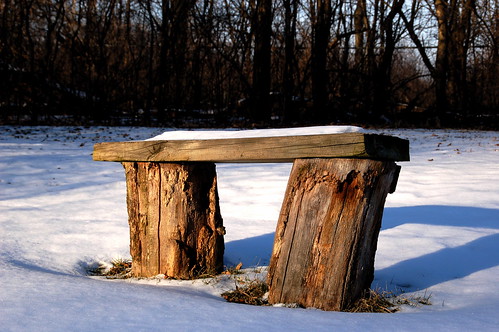I have something new for my baby book today. My mother has my book in Omaha somewhere with a lock of my hair from my first haircut and the birth announcements and information about my first steps and first words.
First you need to know that I have always been at best a reluctant feminist, that I was one of the last people around here to change to gender-inclusive language when talking about God. Next you need to know that one of the predecessor institutions which formed
LSTC was
Seminex, the Seminary in Exile from the Missouri Synod Seminary where students and faculty walked out of the Seminary and that tradition many years ago largely over issues like female ordination. When that body voted against female ordination, a large group of all men, including some faculty members who are still teaching at
LSTC today, left with no plans for their future except that they could not be a part of that group anymore. Needless to say, because of that institutional heritage,
LSTC is a very open place for female would-be pastors. In fact it was one of those
Seminex Professors who finally modelled gender inclusive language for God enough that I started using it. Around here, the belief in ordination of females is a fundamental assumption that isn't even really talked about anymore. It's a given. It's like talking about the earth being round, earth shattering at some point in history, but hardly shocking today.
I have two friends who are remarkable men. Young men, both younger than me. Both are extremely intelligent. One is, in some ways, one of my closest confidants in the world. I respect both men implicitly. They are both very kindhearted, tolerant, progressive and unselfish. Essentially they are exactly the kind of people you want to have as pastors. I trust them enough to jump out of a plane if they told me it was safe.
Today I had lunch with these two men. We were, as we often do, talking about theology. My close friend said that he thought, now that we have agreed with the Catholics on justification, that we ought to rejoin them, "submit" to the Roman Catholic church was what he said. He said submitting was the Christian thing to do, even though as Lutherans we would have to just change some of our policies and confessional beliefs to do so. In the interest of Church unity, we ought to submit. My other friend said he thought it wasn't a bad idea exactly. I disagreed and put forth the standard reasons, the
hierarchical structure, the Pope, the veneration of the Saints, the policy on
penitence, etc.
Then, in the middle of one of my friend's statements, I thought about the differences and exclaimed, interrupting him, that there was no way we could return to the Catholic church because of its policies on women and because women cannot be ordained as priests. I expected I had hit a home run. For me the question was settled. I expected them to both say "Oh yeah, I didn't really think about that." Instead, both said something to the effect of yes, it was a shame, but that was essentially a sacrifice they were willing to make in the interest of Church unity. My close friend suggested that we could all work together inside the church to reform it and eventually women would again be able to be fully ordained as pastors/priests.
I was shocked. Surely they just hadn't thought about it I thought. So I thought I would make it less abstract for them. "That would mean that all of the women in your classes would not be able to be pastors." They were both willing to sacrifice their classmates ordination, the unqualified acceptance of women as equally acceptable to partake in all aspects of Christian community and practice. One of them said "There are lots of very pious happy nuns." For me that statement suggested that women should/could learn to adjust. I started shaking and said we needed to discuss something else. Tears welled in my eyes. I was startled by my own strong reaction. The men respected my boundary and we talked about something else. My close friend sought me out tonight because he wanted to understand and he felt bad and had detected some error in his thought.
I had never felt oppressed until this lunch.
Although I am a woman, I've not felt that I was treated differently because of it. I have more education than almost any men around (makes getting a date tricky) and I've been in traditionally male-dominated professions like law. I come from a now upper-middle class family. I have the kind of personality or a mean looking face, or something that makes people typically take me seriously and not doubt my ability to do something. Or at least I am argumentative and stubborn enough that people generally don't tell me I can't do something because they know they will just waste their time even if I really can't do it. I've generally been exempt from feeling the exercise of power over or against me. My parents were supportive and generally let me help my dad with construction projects while my brother helped my mom make lunch.
What I learned today is that oppression is latent. Discrimination is powerful because it exists in the silent places in the mind, because it becomes part of the fabric of a culture. If I had that same conversation with men I didn't respect quite as much or men I didn't think wanted to do the right thing or men who I didn't think truly valued and believed in the equality of women, I would not have been so disturbed. These are men I trust to look out for my best interests far before their own. I was not mad at them because they didn't understand they were wrong. I was shocked and horrified to realize I live in a world where men I respect, young men, still think that women's equality to men is not one of the basic premises of life, that it is something which can be sacrificed if necessary, and that it isn't shocking for them to think of living in a world where women are lesser and that they could think of asking of their sisters to submit to an authority which sees them as lesser and will not accept them as pastors.
So today I realized what it really means to be oppressed. It means to be asked by someone who is perfectly good intentioned to make a forced sacrifice for something they value. It means they are willing to decide that your feelings and thoughts are expendable in the right situations. It means well-intentioned people think that your equality with them is something that can be negotiable for the right reasons. It means that still, in the back of their minds, they think that open discrimination against you is acceptable in some way under some circumstances.
I confess, I didn't believe our brothers and sisters in other oppressed classes who told me that I and other good, well-intentioned people can be accidentally oppressive. I resisted the idea that discrimination was institutionalized. I worried that focusing on discrimination was actually more divisive than uniting.
After my lunch experience today, I am not sure exactly what I feel about what should be done. I still think that I have been given all of life's opportunities and that others are openly oppressed whereas I am living in a situation where the oppression doesn't really become a factor in my life very often. I did learn my grammar today. Oppression is a noun, not a verb. It isn't an action, it's a state of existence. That it could ever be justified by thinking people in the name of anything Christian is a hard reality to swallow. Mark my baby book. Today was baby's first oppression. Today my eyes were opened to some of the latent cruelties in the world.


















